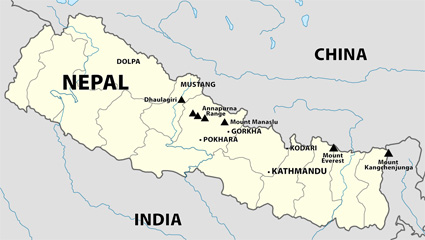Advocates urge Nepal to avoid criminalizing religious conversion
FALLS CHURCH, Va.—An international coalition spearheaded by the 21st Century Wilberforce Initiative, with significant Baptist involvement, urged government officials in Nepal to remove from the nation’s proposed constitution language criminalizing “any act to convert another person from one religion to another.”
 Elijah BrownMore than 350 individuals from a dozen countries—including 291 Americans from 26 states—signed a letter dated Aug. 18 to Nepal President Rambaran Yadav, Prime Minister Sushil Koirala and members of the nation’s Constituent Assembly.
Elijah BrownMore than 350 individuals from a dozen countries—including 291 Americans from 26 states—signed a letter dated Aug. 18 to Nepal President Rambaran Yadav, Prime Minister Sushil Koirala and members of the nation’s Constituent Assembly.
The letter urges Nepal’s elected officials to reject language in a draft proposal of the constitution that letter signers believe “nullifies and criminalizes the freedom to share, change and choose one’s religion.” Nepal’s Constituent Assembly expects to vote on the constitution later this month.
“We seek to stand in solidarity with the diverse religious and ethnic minorities which represent the fullness of the country of Nepal and who want to be assured that their concerns and interests as citizens are properly represented in the draft constitution currently under consideration,” says the letter, written by Elijah Brown, chief of staff with the 21st Century Wilberforce Initiative and former professor at East Texas Baptist University.
The 21st Century Wilberforce Initiative is a human rights organization based in Falls Church, Va., led by former Baptist General Convention of Texas Executive Director Randel Everett.
About 80 percent of the people in Nepal are Hindu. The 5.6 million non-Hindus in Nepal include about 17,000 Baptists in 167 established churches—with more than 20 members—and 250 fellowships—congregations with fewer than 20 members.
 The letter commends Nepal for including in its proposed constitution language recognizing the country’s multireligious character and calling for an end to discrimination “relating to class, caste, region, language, religion and gender.”
The letter commends Nepal for including in its proposed constitution language recognizing the country’s multireligious character and calling for an end to discrimination “relating to class, caste, region, language, religion and gender.”
However, the letter cites concern about Section 31(3) of the constitution’s draft, which says: “No one shall behave, act or undertake activities that breach public order or break public peace/peace in the community; and no one shall attempt to change or convert someone from one religion to another, or disturb/jeopardize the religion of others, and such acts/activities shall be punishable by law.”
Potential to violate human rights treaties
That provision possesses “potential to violate multiple international agreements ratified by the government of Nepal, as well as the intrinsic human rights of millions of Nepali citizens,” the letter states.
It also violates Articles 18 and 19 of the Universal Declaration of Human Rights, as well as the International Covenant on Civil and Political Rights, the letter adds.
“The freedom to share, choose and change one’s religion are among the fundamental rights of man necessary for a just society and the flourishing of its citizens, and since these freedoms always involve ‘acts to convert a person from one religion to another,’ the current draft of Section 31(3) contravenes the ICCPR, the UDHR and the numerous other international human rights agreements,” the letter states.
“There is also ample evidence to suggest that heavy restrictions imposed upon freedom of religion and expression encourages social and political instability by empowering radical elements of dominant religious groups to marginalize and prosecute members of religious minorities. The instability caused by this marginalization results in a long list of repercussions, from religiously motivated violence and negative international press to painful economic implications, such as reduced foreign investment and tourism.”
Members of the BREAD—Baptist Relief and Development—Network, including representatives of Texas Baptists’ Christian Life Commission and BMS World Mission in England—worked closely with the 21st Century Wilberforce Initiative in drafting the letter and enlisting people to sign it.
Signers of the letter
Individuals who signed the letter include Suzii Paynter, Cooperative Baptist Fellowship executive coordinator; Brent Walker, executive director of the Baptist Joint Committee on Religious Liberty; Robert Parham, executive director of the Baptist Center for Ethics; and former Congressman Frank Wolf, the Jerry and Susie Wilson Chair in Religious Freedom at Baylor University.
Educators included Ken Starr, Baylor’s president and chancellor; Gary Cook, chancellor of Dallas Baptist University; Samuel W. “Dub” Oliver, president of Union University; Jerry Cain, chancellor of Judson University; and Gene Wilkes, president of the B.H. Carroll Theological Institute, along with professors and students from multiple schools.
The 163 individuals from Texas who signed the letter include David Hardage, BGCT executive director; Kathy Hillman, BGCT president and director of the Keston Center for Religion, Politics and Society at Baylor University; Gus Reyes, CLC executive director; Joel Allison, chief executive officer of Baylor Scott & White Health; Albert Reyes, president of Buckner International; Jeff Smith, president of the Baptist Foundation of Texas; Marv Knox, editor of the Baptist Standard; and Jim Denison, founding president of the Denison Forum on Truth and Culture.